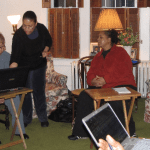African American, Asian American and Latino senior citizens are economically vulnerable and getting more so, a new report by The Greenlining Institute, a multi-ethnic public policy research and advocacy institute, finds.
 Because minority seniors have less access to pensions or other forms of retirement savings, these groups may be particularly vulnerable to the effects of cuts to Social Security and Medicare likely to be considered by the 12-member special congressional committee created by the budget deal signed this week by President Obama.
Because minority seniors have less access to pensions or other forms of retirement savings, these groups may be particularly vulnerable to the effects of cuts to Social Security and Medicare likely to be considered by the 12-member special congressional committee created by the budget deal signed this week by President Obama.
“While the recession has affected all Americans, the effects have been truly devastating for Latinos, African Americans and Asian Americans hoping to retire with some dignity,” said Greenlining Institute Community Reinvestment Director Preeti Vissa.
Other highlights of the report include:
An astonishing 91 percent of African American and Latino seniors are financially vulnerable. While data on Asian Americans is more sparse, some Asian ethnic groups have poverty rates three to four times that of whites.
Federal poverty standards fail to measure factors that disproportionately affect elders, leaving many who are financially struggling uncounted – and thus ineligible for many benefits. More accurate measures like the “Elder Index” developed at UCLA find shockingly high levels of seniors struggling to make ends meet.
The “three-legged stool” of retirement security (Social Security, pensions and savings) is collapsing. For a variety of reasons, seniors of color have had less access to all of these sources of support, including less access to employee retirement plans.
The foreclosure crisis has greatly worsened the wealth gap between racial groups in recent decades. The ongoing foreclosure crisis has disproportionately affected black and Latino families, draining over $213 billion in wealth from these communities
The budget cuts impair vital programs that assist struggling senior citizens, while asset caps that limit enrollment in many programs force low income seniors to drain their meager savings in order to qualify for life-saving assistance.
“There are concrete actions that federal and state governments can take, but the essential first step is to recognize the extent of the problem – and to immediately take off the table any proposal that will plunge our most vulnerable elders into poverty,” Vissa declared.


